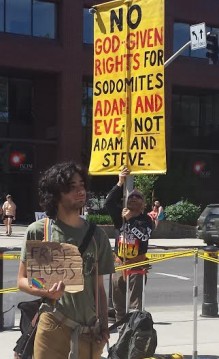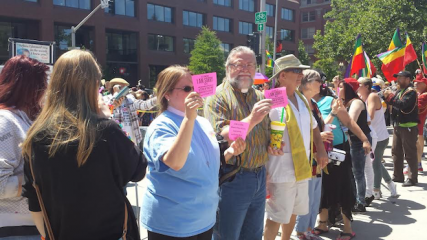
Spokane’s 24th Annual Pride Parade and Rainbow Festival showed an increase in representation of local faith communities, all of which, except for the Spokane Street Preachers (SSP), were open and affirming congregations and were present to participate in the celebration.
As in years past, SSP members used microphones and large signs to protest the event. One SSP member, Kristinea (who refused to give her full name) said the SSP believes in and speaks publicly about what the Bible says.
“It is very important to stand against wickedness,” Kristinea said.
She explained the SSP were there to warn Pride participants that unless they repent, they will be deemed guilty before God on Judgement Day, and will pass into a lake of fire for all eternity.
“Would you ever wanna’ see your fellow human burn up in a fire? In a house fire, let’s say? Wouldn’t you try and save them if you could?,” said Kristinea.
The parade route ended near the protesters’ designated location, and the end of the parade showed a significant increase in interaction between Pride participants and protesters. Pastors from the open and affirming churches lined up along the fence separating the protesters and the participants after they had finished walking in the parade.
“It’s important to be here to send the message to the GBLT community that there is a whole community of Christians that are caring and inclusive and who don’t make judgements,” said the Rev. Deb Conklin, pastor of two Methodist churches in Spokane.

The pastors represented a diverse array of denominations, but they stood together holding pink slips of paper that read, “God is love. Whoever lives in love lives in God, and God in them. John 4:16b.” The other side of the paper apologized on behalf of Christians that “denied rights and equality to so many in the name of God.”
Bishop Thomas Altepeter, cofounder of St. Clare Ecumenical Catholic Community participated in the parade and the peacekeeping that followed.
His wife, Carla Altepeter, said, “we are very much in support of the LGBT community. We welcome all people and wanted to show that to the community as we all gather for this very important day.”
Carla explained that Ecumenical Catholicism allows anyone who is called to the priesthood, to be ordained, no matter their sex, gender, or sexual orientation.
“There needs to be a Catholic tradition welcoming to all,” she said.
Members of the open and accepting congregations also felt it was important to offer a religious alternative to the SSP and other groups that agree with them. Todd Hart, a member of the congregation at Veradale United Church of Christ said he believes, “God loves all of us regardless of our gender identification or our sexual orientation. It’s not a sin.”
The pastor of the All Saints Lutheran Church, the Rev. Alan Eschenbacher, said he was standing in front of the protesters to offer an “alternative to hate.”
“I think it’s important to recognize that God loves everyone, all people equally, even them (pointing behind himself at the protesters),” Eschenbacher said.
Kristinea of the SSP also spoke about love: “Isn’t it loving to warn a kid before they run into the street that it’s dangerous?”
It is unlikely that extremely contradictory interpretations of religious texts will ever go away, but Pride does not seem to be going anywhere either.
“I can tell you that in Spokane we have evolved from a very few people in the parade and a lot of hate, to a very few haters and a lot in the parade,” said the Rev. Paul Rodkey, who has pastored Bethany Presbyterian Church for the past 28 years.
The first Spokane Pride was in 1992 with just a few marchers on the sidewalk. Now, Pride hosts over 6,500 participants, about double the number of attendees in 2011, and over 20 times the number of participants in 2004, according OutSpokane, the organization in charge of Spokane Pride.
View more photos of this event on the SpokaneFAVS Facebook page.









As a peace keeper (marshal) provided every year by the Peace and Justice action League of Spokane, I have trouble with the portrayal of SSP above. I do not doubt that the conscious and public motive of their screaming at the celebrators how they were dirty child molesters and perverts might seem good. After all, they justified their behavior by saying they were lovingly concerned about saving the souls of the celebrators from an eternity in Hell. They would not listen to any discussion or correction (E.g.., Sodom was not destroyed because of homosexuality but because heterosexuals wanted to rape angels, a sexless group, thereby violating the fundamental virtue of hospitality). They used graphic and filthy language that shocked even me. I wish my mother had been there with a bar of soap to wash out their mouths. They seemed to delight in how offensive they, in the name of Jesus, could get away with such filth. The effect of such behavior was to incite some of the celebrators into shouting matches. Last year some were even incited to throw things at SSP screamers. This year SSP was not attacked that way, although they seemed to relish in the idea. They could boost their egos with the thought of how much persecution they suffered for Jesus. The problem for us is not how to silence them, but how to ignore them. Let’s not dignify them by suggesting they were not very offensive.
Agreed. They claim their intent is nouthetic because that allows them to express their hate and imagine themselves as warriors for love and righteousness–two virtues they fail spectacularly to understand. “A servant of the Lord must not quarrel but must be kind to everyone, be able to teach, and be patient with difficult people.” (2 Timothy 2:4) Looking at those very different groups of people that Saturday, I had no difficulty telling which were servants of the Lord and which were not.
Thank you very much Tom and Brad for your contributions to what I hope is an ongoing discussion! I absolutely understand your concerns and I appreciate the feedback immensely.